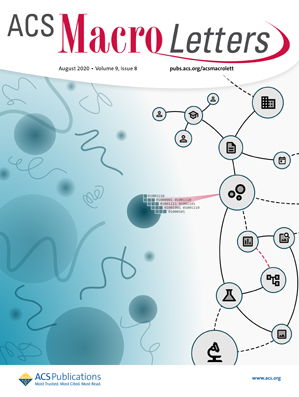Stiffening and Toughening Rigid Polymers Through Controllable Stress Concertation Induced by Hard-Hard Dual Nanophases.
IF 5.1
Q1 POLYMER SCIENCE
引用次数: 0
Abstract
Rigid polymers generally face the rigidity-extensibility trade-off due to the contradictory requirements for chain-segment movability. Herein, both the rigidity and extensibility of rigid poly(lactic acid) PLA are obviously improved based on the controllable stress concentration induced by hard-hard dual nanophases, overcoming the long-standing trade-off. Based on masterbatch method and short-term low-temperature annealing, nanodispersed CNTs and nanoscale PLA crystals are constructed in PLA to serve as rigid stress concentrators with small size and high quantity. With the designed hard-hard dual nanophases, the Young's modulus, elongation at break, and toughness of PLA are improved by 32%, 644%, and 776% respectively. The combined high improvement in rigidity and extensibility is unprecedented for PLA. The toughening mechanism is revealed to be that hard-hard dual nanophases can initiate plentiful small-sized microcracks and suppress the development of microcracks during continuous deformation. Besides, the high rigidity of hard-hard dual nanophases imparts PLA with a significantly improved rigidity. Moreover, dual-nanophase PLA also shows improved heat resistance and electrical conductivity. We envision that this work will enrich the theory of polymer toughening and contribute to the industrial preparation of polymers with excellent comprehensive performances.硬-硬双纳米相诱导的可控应力集中对刚性聚合物的增强和增韧。
由于对链段可动性的矛盾要求,刚性聚合物通常面临刚性与延展性的权衡。在此研究中,硬-硬双纳米相诱导的可控应力集中明显提高了刚性聚乳酸PLA的刚性和延伸性,克服了长期存在的权衡。基于母粒法和短期低温退火,在聚乳酸中构建了纳米分散的CNTs和纳米级聚乳酸晶体,作为小尺寸、高质量的刚性应力集中剂。通过设计的硬硬双纳米相,PLA的杨氏模量、断裂伸长率和韧性分别提高了32%、644%和776%。在刚性和延伸性方面的综合高改进是PLA前所未有的。结果表明,在连续变形过程中,硬-硬双纳米相能激发大量的小尺寸微裂纹,抑制微裂纹的发展。此外,硬-硬双纳米相的高刚性使PLA的刚性得到显著提高。此外,双纳米相PLA还表现出更好的耐热性和导电性。我们期望这项工作将丰富聚合物增韧的理论,并有助于工业制备具有优异综合性能的聚合物。
本文章由计算机程序翻译,如有差异,请以英文原文为准。
求助全文
约1分钟内获得全文
求助全文
来源期刊
CiteScore
10.40
自引率
3.40%
发文量
209
审稿时长
1 months
期刊介绍:
ACS Macro Letters publishes research in all areas of contemporary soft matter science in which macromolecules play a key role, including nanotechnology, self-assembly, supramolecular chemistry, biomaterials, energy generation and storage, and renewable/sustainable materials. Submissions to ACS Macro Letters should justify clearly the rapid disclosure of the key elements of the study. The scope of the journal includes high-impact research of broad interest in all areas of polymer science and engineering, including cross-disciplinary research that interfaces with polymer science.
With the launch of ACS Macro Letters, all Communications that were formerly published in Macromolecules and Biomacromolecules will be published as Letters in ACS Macro Letters.

 求助内容:
求助内容: 应助结果提醒方式:
应助结果提醒方式:


